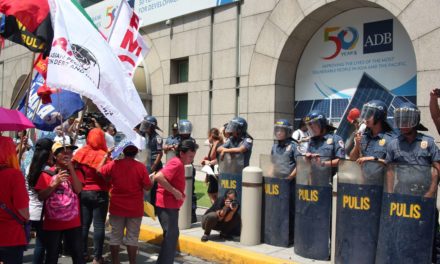THE COUNTRY should carefully study investment provisions before entering into foreign trade agreements (FTAs) as these may infringe on government’s regulatory power on foreign firms, an advocacy group on Friday said.
This statement comes as the government prepares for FTA negotiations with the European Union (EU), which is expected to push through before the end of the year.
In a forum, the EU-Association of Southeast Asian Nations (ASEAN) FTA Campaign Network said loosely defined investment rules in trade deals may limit policy space of governments, thereby preventing them from ensuring public interest.
“An emerging trend in the international investment regime is the increasing use of free trade and economic partnership agreements as instruments for securing greater investor protection,” the group said.
It cited as an example leaked texts of EU negotiation documents with Canada, India, Singapore and Malaysia, which included loosely defined provisions such as “fair and equitable treatment” and laid down procedures favoring foreign corporations in investor-to-state dispute settlement (ISDS).
“EU [bilateral investment treaties] have cost developing countries millions and have limited governments’ policy space to regulate in favor of national development and to protect human as well as labor rights, and the environment,” said Cecilia Olivet, researcher at the Netherlands-based Transnational Institute.
Joseph Purugganan, coordinator of the EU-ASEAN FTA Campaign Network concurred, adding that ISDS in particular allows private parties to challenge sovereign acts of governments.
“Investment chapters with investor-to-state dispute settlement (ISDS) mechanisms in FTAs can expose us to more suits from foreign corporations,” Mr. Purruganan said.
He noted that as of the end of 2010, a total of 390 ISDS cases have been filed, 60% of which involved developing countries.
In the Philippines, three firms already lodged disputes against the government due to discontinued contracts.
These include Swiss inspection firm Societe Generale de Surveillance, which the government contracted for pre-shipment inspection services, and the Belgian dredging firm Baggerwerken Decloedt En Zoon, which was supposed to implement the Laguna de Bay rehabilitation program.
The latest case was the German airport operator Fraport AG Frankfurt Airport Services Worldwide and its Filipino partner, Philippine International Air Terminals Company, Inc. (Piatco), which the government contracted for Terminal 3 of the Ninoy Aquino International Airport.
Government-incurred costs for the Fraport and Piatco dispute before the International Center for Settlement of Disputes (ICSID) already amounted to about $58 million, the EU-ASEAN FTA Campaign Network noted.
Local courts, meanwhile, have already ordered government to pay Piatco $175 million as just compensation.
However, Harry Roque, director of the University of the Philippines Institute of International Legal Studies, said the Philippines should enforce ICSID decisions, having signed the convention.
“All parties to the convention are required to enforce ICSID decisions as if they were final and executory decisions of domestic courts,” Mr. Roque said.
He agreed, however, that such policies result in a “conflict between the sovereignty and jurisdiction of states and property rights of [foreign firms].”
“This is one field of international law that has only nominal values for parties with capital,” Mr. Roque said. — Kim Arveen M. Patria





![[IN PHOTOS] In Defense of Human Rights and Dignity Movement (iDEFEND) Mobilization on the fourth State of the Nation Address (SONA) of Ferdinand Marcos, Jr.](https://focusweb.org/wp-content/uploads/2025/07/1-150x150.jpg)

